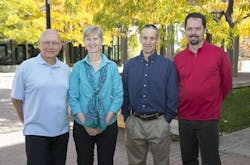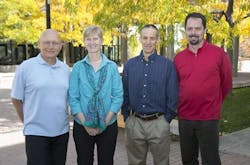University researchers awarded 2014 Creativity Prize for water resource innovations
BOULDER, CO, Oct. 28, 2014 -- Groundbreaking research conducted by the University Corporation for Atmospheric Research (UCAR), University of Colorado Boulder (CU Boulder) and National Oceanic and Atmospheric Administration (NOAA) was recently recognized with the 2014 Creativity Prize from the Prince Sultan Bin Abdulaziz International Prize for Water -- one of the world's most prestigious awards for innovations related to water resources.
Over the past five years, the research team has been working to develop a way to use GPS technology to measure soil moisture, snow depth and vegetation water content. "It's an honor to be recognized by the broader international science community," said UCAR scientist John Braun, a GPS expert and member of the research team. "This work can significantly improve how we measure changes in a number of key components of the water cycle." The research has been funded by the National Science Foundation and NASA.
Braun and his colleagues -- Kristine Larson and Eric Small at CU Boulder and Valery Zavorotny at NOAA's Earth System Research Laboratory -- won the prize for developing a new observational technique that utilizes data from high-precision GPS stations. Although GPS instruments at these stations were installed to measure plate tectonic motions and land boundaries, the research group was able to isolate GPS signals that reflected near the instruments' antennas to produce daily measurements of soil moisture, vegetation water content and snow depth. The group named the technique GPS Interferometric Reflectometry (GPS-IR).
Because there are currently over 10,000 such GPS stations operating around the world, the extension of this method to even a subset of these sites would significantly enhance the ability to measure the water cycle. Currently, the team uses the GPS-IR technique to analyze data streams from existing GPS networks within the western United States. Scientists and government agencies can use their data products, available at the research team's web portal (found here), to improve monitoring and forecasting of hydrologic variables.
GPS-IR is based on reflected signals, which are a source of errors that have plagued the primary users of GPS technology since its inception. "The GPS-based estimates represent a larger sampling area than traditional point measurements gathered in the field," said Small, a professor in CU Boulder's Department of Geological Sciences. "This provides information that is particularly useful for applications such as tracking the amount of water stored in mountain snow pack."
The Prince Sultan Bin Abdulaziz International Prize for Water aims to give recognition to the efforts that scientists, inventors and research organizations around the world are making in water-related fields. The prizes acknowledge exceptional and innovative work that contributes to the sustainable availability of potable water and the alleviation of the escalating global problem of water scarcity. The 2014 Creativity Prize, worth $266,000, was split between the Boulder-based GPS-IR group and scientists at Princeton University studying drought.
See also: "NOAA, partners forecast 'dead zone' conditions in Gulf of Mexico, Chesapeake Bay"
###

